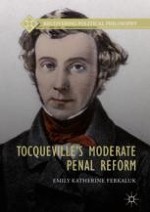2018 | OriginalPaper | Buchkapitel
4. Tocqueville’s Moderation and Lieber’s Idealism in Penal Reform
verfasst von : Emily Katherine Ferkaluk
Erschienen in: Tocqueville’s Moderate Penal Reform
Aktivieren Sie unsere intelligente Suche, um passende Fachinhalte oder Patente zu finden.
Wählen Sie Textabschnitte aus um mit Künstlicher Intelligenz passenden Patente zu finden. powered by
Markieren Sie Textabschnitte, um KI-gestützt weitere passende Inhalte zu finden. powered by
